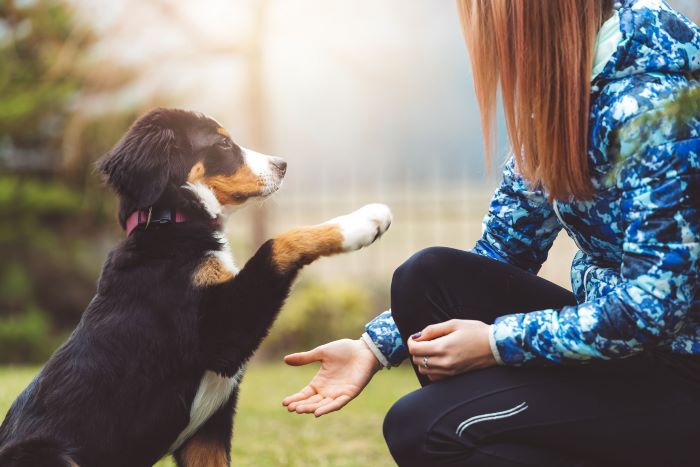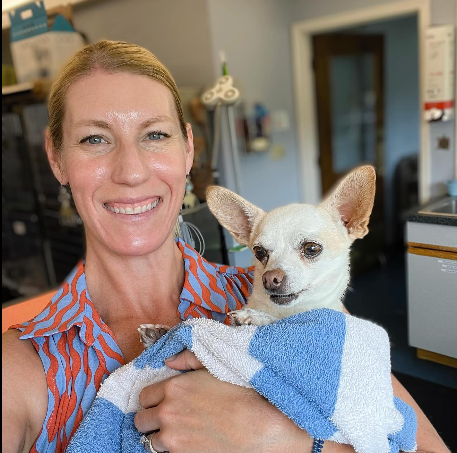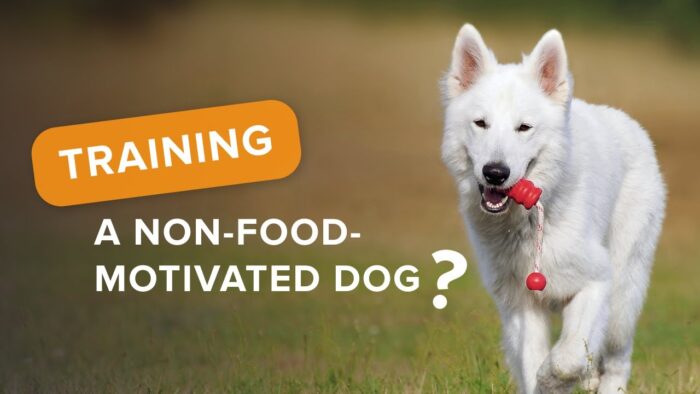It can be very frustrating when you’re trying to train your dog but they don’t seem motivated by food rewards. This is actually more common than you might think. Some dogs are just not as food-driven as others. The good news is that there are many things you can do to motivate your dog and effectively train them, even if they aren’t excited by treats. In this article we talk about How To Train A Dog Not Motivated For Food.
Table of Contents
Reasons Your Dog May Not Be Motivated By Food
Here are some of the most common reasons a dog may not be motivated by food rewards during training:
- They’re already well-fed – Dogs that have constant access to a full food bowl may feel less inclined to work for food during training sessions.
- Health issues – Medical conditions affecting appetite or the ability to digest food can understandably dampen a dog’s enthusiasm for treats. These issues should be evaluated by a vet.
- Stress or anxiety – Dogs may lose interest in food when stressed. If your training methods are causing anxiety, your dog may be too uneasy to eat.
- Age – Appetite often decreases in senior dogs. Using treats they find irresistible can help motivate older pups. Puppies may also get distracted and overlook treats during training.
- Certain breeds – Some breeds like Siberian Huskies are naturally less inclined to view food as a reward. Their independent nature makes motivation more challenging.
- They want attention instead – Your dog may prefer praise, play, and affection over food rewards. Identify what truly motivates them.
Tips For Training

A Dog Not Motivated By Food The key is to determine what specifically motivates your individual dog and use that as positive reinforcement during training sessions. Here are some smart tips:
Use Higher Value Treats
Experiment with different types of treats to find something extra enticing to your dog. Soft treats with strong smells often work well for less food-motivated pups. You can also try small pieces of chicken, cheese, hot dogs, liver treats, or freeze-dried meat treats. Make training treats more exciting by only using that special food for sessions.
Keep Training Sessions Short
Dogs with lower food drive often have shorter attention spans too. Keep training sessions to just 5-15 minutes max to retain engagement. You can do several short sessions throughout the day rather than one long session. Always end on a positive so your dog leaves wanting more.
Explore Other Reward Options
If your dog truly doesn’t like food, leverage alternative rewards instead. Most dogs love getting affection and attention from their owner. Verbal praise, belly rubs, playtime with toys, or opportunities to greet other dogs can be used as rewards instead. Identify what your dog enjoys most besides food.
Consider Using Markers
Marker training uses distinct sounds like a clicker or verbal marker word (“Yes!”) to precisely mark desired behaviors. The marker indicates to your dog that a reward is coming. The reward doesn’t have to be food – it can be affection, play, or anything your dog enjoys. This technique is helpful for dogs unmotivated by treats.
Add Variety To Your Training Locations
In addition to new rewards, also train in new places to keep things exciting. Train indoors, outdoors, on walks, at parks etc. New environments will help retain your dog’s interest and motivation.
Invest In Interactive Dog Toys
There are many great interactive food puzzle toys for dogs. These provide mental stimulation by requiring your dog to move pieces and uncover hidden food inside. They make achieving treats an engaging game rather than just handing them out freely. This can amplify your dog’s food motivation.
Rule Out Any Health Issues
As mentioned, certain medical conditions can severely reduce appetite in dogs. Issues like dental disease, gastrointestinal problems, cancer and more may require veterinary attention. It’s important to rule out the potential of your dog feeling unwell before addressing behavioral causes of low food drive.
Consider Working With A Certified Trainer
If you’re still struggling to motivate your dog after trying these methods, don’t hesitate to recruit a professional. Certified dog trainers have a wealth of experience identifying unique motivators for each pup. They can evaluate your training approach and pinpoint exactly why your dog may not be engaged. A few private lessons can get your training efforts back on track.
The Takeaway On Training Dogs Not Motivated By Food
The most essential element for effectively training a dog is finding what truly motivates them. While food works for many pups, others require more creativity with rewards and techniques. Identifying alternative reinforcement options for your individual dog and keeping training sessions fresh and engaging will yield the best results. With patience, you can condition low-food drive dogs to view training as its own reward by associating it with other things they love, like playtime and affection. I sincerely hope you find this “How To Train A Dog Not Motivated For Food” article helpful.

Dr. Allison Kramer is a seasoned veterinarian with a Master’s degree in Animal Behavior and over 10 years of experience specializing in canine health and behavior. Her expertise in positive reinforcement training and holistic care enhances the well-being of dogs and fosters strong pet-owner relationships. For expert advice and valuable insights, follow Dr. Kramer on Instagram @dr.allisonkramer.





